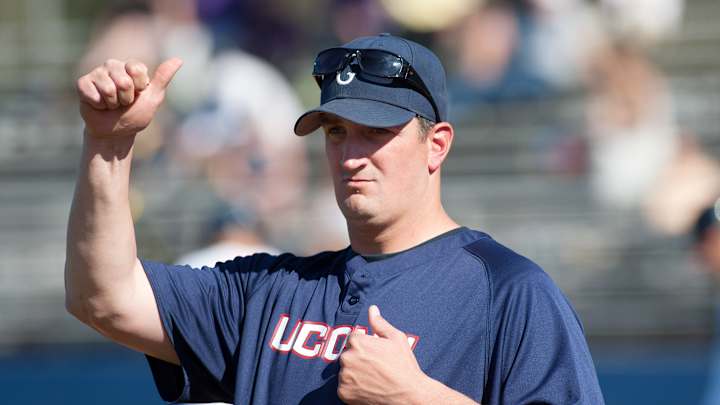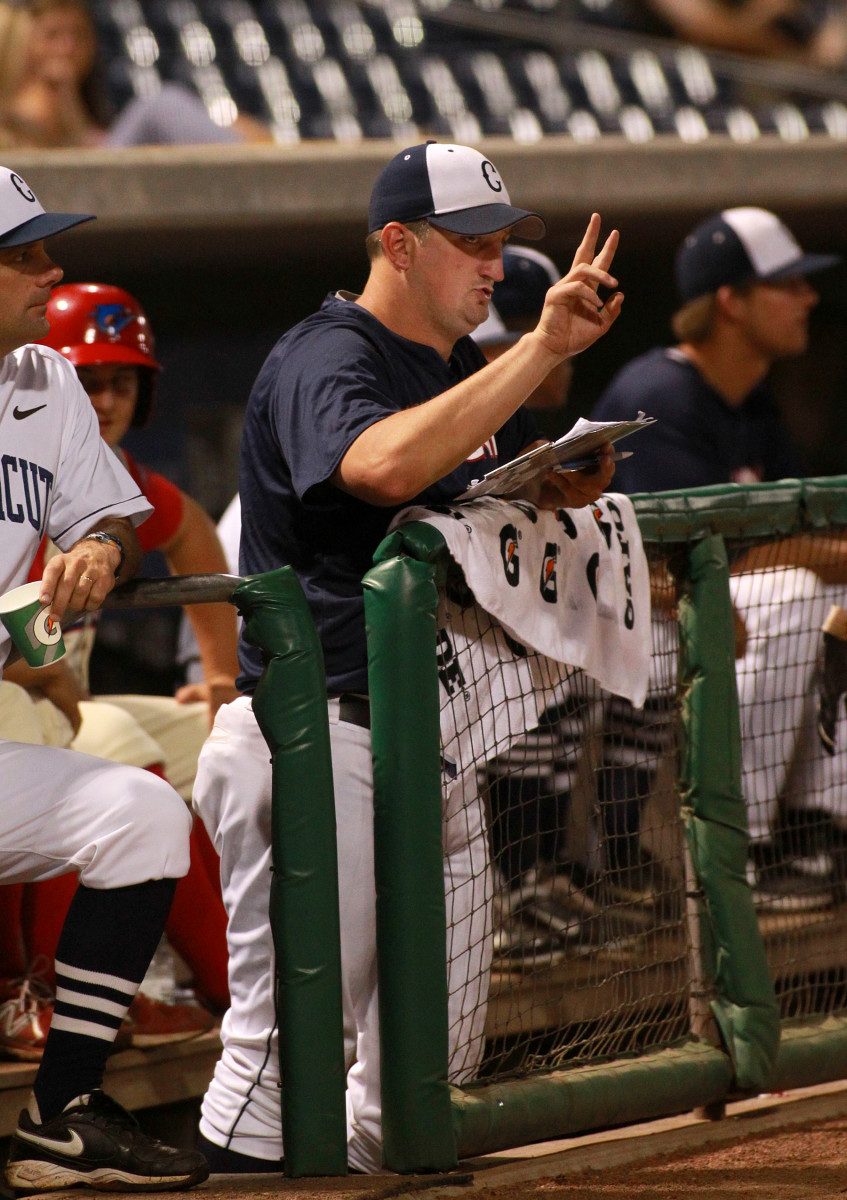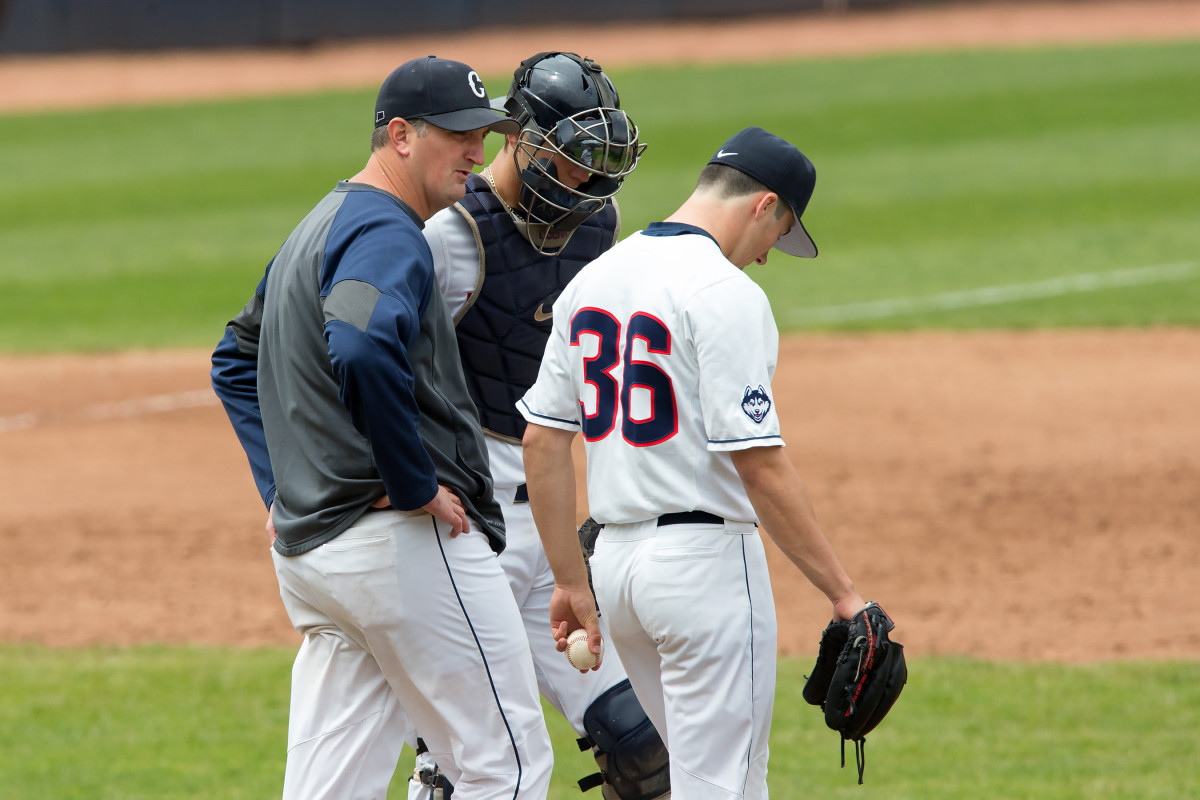The Midas Touch: Inside Josh MacDonald’s Rise to Becoming One of the Top Pitching Coaches in the Country

One of the great joys about being young is the power of imagination. With no comprehension of stress, it’s just so easy to become anything you want to be. A police officer, a doctor, a professional athlete, you name it. It’s the only time in our lives where we can be whoever we want.
As we graduate from childhood into adulthood, reality sets in and so many of us end up pursuing a career path that is quite different from the one we envisioned as a child. Working becomes a means to survival, and suddenly the days of playing cops-and-robbers without a care in the world fade into oblivion.
If one was ever able to pull an Inception and get into the head of Josh MacDonald as a child, they would be fascinated by how often baseball was on his mind. Currently entering his 11th season as the pitching coach for the UConn baseball program, MacDonald – or “Coach Mac” as he is known around Storrs – fell in love with America’s pastime at the age of three. As he continued to dominate the competition at every level of his growth, his dream of making it to the major leagues was that close – until life threw him a few curveballs along the way.
“My dad was a huge Red Sox fan and baseball fan himself, so I think that's kind of how I fell in love with the game,” said MacDonald. “I was memorizing the backs of baseball cards at 5-6-7 years old. I could tell you how many doubles Mike Greenwell had in 1988 and things like that. I can't do that now, but that was pretty cool back then.”
As a Little Leaguer and then in high school, where he starred on the mound for Notre Dame-West Haven, MacDonald was putting up numbers of his own that were baseball-card worthy. He was practically unhittable, racking up wins and strikeouts like Taylor Swift does Grammys.
Along with his success came the accolades. In 2001, his senior season, he was named the New Haven Register’s All-Area MVP. Scouts took notice too. The Pittsburgh Pirates selected him in the 47th round of the 2001 MLB Draft. As easy as it would have been for him to fulfill his childhood dream at that very moment, anyone who knows MacDonald wouldn’t be surprised to learn why he turned down that chance.
“The second I started playing, I knew I was better than a lot of the people around me and I had the numbers to back it up,” he said. “I definitely felt I was worthy of being drafted much higher. But I created a different path for myself and I have no regrets.”
MacDonald decided to take his talents to Storrs, Conn. He was the pitcher of record for Jim Penders’ first win as UConn baseball coach. What no one knew at the time, however, is that it would be the first of many wins that MacDonald and Penders would go on to enjoy together.
Turning the Page

MacDonald’s dream of making it to the big leagues ended up fizzling out at UConn, not because he didn’t put up the same video game-like numbers that he did in high school, but because he blew out his elbow and needed Tommy John surgery. Suddenly, throwing a baseball didn’t come as easy for him as it did his entire life up until that point.
Although the injury prevented him from making millions – let alone living out the career path he laid out for himself as an infant, he holds no grudges. In fact, given the opportunity to do it all over again, he’d jump at it.
“I think if I hurt myself or did something to myself under the pretenses where it was all about me going pro and making millions of dollars, then yeah, maybe I would have a grudge at this point,” MacDonald said. “But I hurt myself trying to win games. Honestly, the only thing I have ever cared about is winning games. Even though the rehab sucked, I would do it all over again because I always felt that if I was on the mound, my team had the best chance of winning.”
While MacDonald’s playing days were over when his career in Storrs was up, one thing that never ended was his love for the game of baseball. He knew it was his calling, even if not in the way he first envisioned it, so he made it a point to look for any opportunities that would allow him to stay involved.
He ended up becoming a graduate assistant for the Long Island University baseball program shortly thereafter, a position he stayed in for three seasons and would have continued in had it not been for budget cuts that came about as a result of the great recession. But it was more than enough time for him to leave his mark on the program. In 2007, his first season on staff, the LIU team earned run average (ERA) was 5.09; in 2009, his final season, it dropped to 4.25.
By now, it really shouldn’t come off as all that surprising that LIU got better when MacDonald was part of it. It’s almost as if he has some kind of direct line into the baseball gods because programs – and by extension individual and team statistics – only get better when MacDonald is around.
And better it got. In summer 2009, MacDonald joined the staff of the Cape Cod Baseball League’s (CCBL) Bourne Braves, who, at the time, were managed by UConn graduate and legendary skipper, Harvey Shapiro. And guess what happened? The Braves won the title that season. If there ever was in fact a Midas, would it be at all shocking if his name was Josh MacDonald?
His Bark is Louder Than His Bite

To some, MacDonald’s confident demeanor may be mistaken as arrogance. But the reality is a certain type of swagger is needed in his profession. While his honesty might go a tad bit too far at times, it’s not something he’s going to apologize for or ever change. He would rather devote his time to helping his players realize their full potential rather than worrying about ruffling a few feathers along the way.
“One of my main theses in coaching is that I think we spend a lot of time worrying about the things we can't do or the things that we're bad at,” he said. “But look, if I recruited you to UConn, you must be good, so let’s try to strengthen your strengths and make those fantastic. I really try to simplify things for the players by being brutally honest and direct. I tell them if their two-seam sucks, it’s not their fault. So I try to get the guys to focus on what they're good at and not harp on the things that they're really bad at.”
While outsiders may be turned off by his matter-of-fact approach, he is beloved within the baseball community because of it. In fact, it made quite the impression on two players in particular who were fortunate enough to be coached by MacDonald while at Bourne and went to bat for him when an opportunity arose at UConn.
During the 2011 CCBL season, the pitching coach position at UConn was vacant. Justin Blood, who held the job prior to MacDonald, had left to become head coach at Hartford that May, and Penders was looking for the perfect candidate to fill the role. MacDonald feels strongly that if it weren’t for the input of those two players, who just so happened to play at UConn, he likely would not be coaching today.
“Pierre LePage and Scott Oberg really went to bat for me,” MacDonald said. “Supposedly Scott pulled Coach Penders aside while at the airport after Coach Blood left and told him, ‘Hey, I think MacDonald would be a really good candidate.’ That may have changed my life. If I didn’t go to the Cape, I don't think I would be coaching today. I’d probably be an athletic director at a prep school or something.”
Penders heard all he needed to and hired MacDonald for the gig. And wouldn’t you know, it didn’t take long for success to follow. During his first year in the job in 2012, UConn’s staff ranked fourth in the Big East in ERA, second in conference-only games and third in batting average against. Oberg was named to the All-Big East first team that season.
And it’s only gotten better from there. Under MacDonald, UConn has posted three of its four best team ERAs since 1980 and eclipsed 500 strikeouts as a staff the past five seasons. What’s more, he has coached six All-American players during his time in Storrs and has had at least one pitcher earn All-America status the past five seasons. In total, 18 of the pitchers he coached have either been selected in the MLB Draft or signed contracts to play professionally. Ben Casparius, Caleb Wurster and Andrew Marrero were three of them, all drafted in 2021.
One of those draft picks to enjoy unprecedented success under MacDonald’s tutelage was Jacob Wallace, a third-round pick of the Colorado Rockies in 2019, the highest a UConn relief pitcher has ever been drafted. Wallace, who ranks fourth in program history in career saves (19), with 16 of them coming in 2019, is quick to credit MacDonald for helping him become one of the all-time greats to ever don the Huskies uniform.
“Coach Mac has played a huge role in my life,” Wallace stated. “He had confidence in me before I had confidence in myself. He knew I possessed the skills to be great and he helped me achieve that greatness and then some on the field. Coach Mac was someone that really drove me to push myself during my time at UConn because of his trust and belief in my abilities. He has high standards, but those standards are never out of reach. He knows what each player is capable of when they walk on campus and he only wants you to achieve that and watch you succeed.”
What’s special about the relationship MacDonald has built with his players is that he is someone they want to continue being part of their journeys well after they leave UConn. Never one to overstep, nothing gives MacDonald greater joy than helping his players achieve what they want to achieve in the sport. And he’ll always make himself available whenever they need him.
Wallace described how MacDonald reached out to him last season when he was struggling. Ultimately, the man with the Midas Touch helped Wallace get back on track.
“He went through as many videos and film he could find, broke everything down and gave me advice on everything he saw,” Wallace said. “After that conversation, I worked on the things he pointed out and he helped turn my season around for the better. So even after my time at UConn, he’s someone I can count on to help me and I know he’s got my back every step of the way, in baseball and in life.”
The Bulldog Mentality

One of the big advantages MacDonald possesses in his job is the ability to draw on the experience of his own playing days to help deepen the bond with his players and earn their trust. While they are taught not to show it on their faces, the pressure that comes with being a Division I baseball player – especially at a high-profile program like UConn – is very real. The opportunity to make millions is at stake, so if the results aren’t there, the contract also won’t be.
MacDonald’s credibility matches his bravado. He’s more than happy to keep practice loose and light, but on game days, it’s anything but. For him, once the umpire yells “play ball,” it’s all about “kicking a--.” If a pitcher isn’t controlling the things he can control, such as the location of his fastball or covering first base on a ground ball, MacDonald is going to let them have it. If they are making their pitches but getting hit, that is something he can live with.
While MacDonald expects everyone he coaches to be model citizens off the field, on the field is a whole different story. When on the mound, he’s totally fine with his pitcher coming across as he does to outsiders – unlikable or overconfident. He understands that it can irritate opponents or fans, but is quick to note that you don’t win baseball games the same way you do political campaigns – by making friends.
“I don't always frown when you hear things like a pitcher has a bad attitude on the mound,” he said. “That doesn't bother me all that much. I don't mind when I hear he's really good, but man, he absolutely hates losing. I’m fine coaching the super clean-cut, good sportsmanship players – PJ Poulin was that way – but if you're looking for a guy that I will kind of lean towards, it would be the one that has a ‘bad attitude’ or may not like taking lumps all that much. I guess I would call it that bulldog mentality.”
For any of those “super clean-cut, good sportsmanship players” that are considering playing baseball collegiately at UConn but are worried about fitting in, fear not. It’s not the exterior that MacDonald really cares about anyway. It’s one’s internal makeup that will dictate whether they will have success in Storrs. If you’re one who would prefer to be pitching mop-up duty rather than when the game is on the line, it’s probably best to look elsewhere.
The list of players quick to single out MacDonald for the impact he has made on their careers is quite robust. While he may not have realized it when he was mapping out his career as a toddler, he was born to be the coach he is today, not the major leaguer he set out to be.
“There’s a reason UConn has such a great track record of preparing guys for the next level, and he’s a huge part of that,” said Poulin, who was drafted in the 11th round of the MLB Draft by the Rockies in 2018 and ended his UConn career by earning BCA/Rawlings third-team All-America status and saving the most games (16) in a single-season (until Wallace matched him a year later). “I’m very thankful for the part that Coach MacDonald has played in my development.”
Confident, but cool. Driven, but goofy. Intense, but personable. Coach, not player. Whether you like him or hate him, this is who Josh MacDonald is. And he makes no apologies for it.
